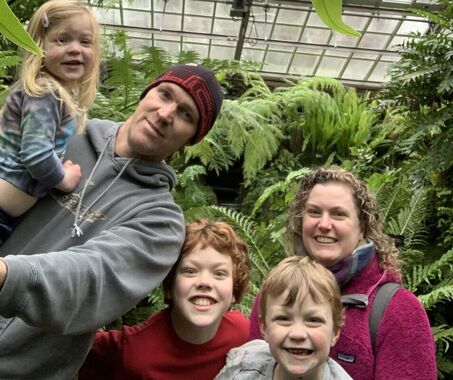This OC Family Interview was originally published in the Winter 2020-21 issue of the "Open Connections Magazine".
Please describe your family constellation.
Mike and Julie (dad & mom), Max (11), Leo (6), and Serafina (3 1/2).
How long has your family been on this path of self/family-directed Open Education?
We’ve been on this path ever since Max was born! When he was a baby we were introduced to and then followed gentle parenting. This naturally transitioned to baby/toddler led learning/playing.
What led you in this direction?
Homeschooling was the next natural step in our parenting journey. When Max was very young we weren’t sure exactly what that would look like or how it would happen. That’s when we started our search for a hybrid approach to combine outside learning, socializing, and gentle self-directed learning.
How did you get involved with Open Connections?
We first heard about Open Connections when Max was 3 yrs old and attended Gymboree play classes. Max’s Gymboree teacher, Marianne Sutera Rhoads, is a former OC parent and she recommended I reach out for a tour. She was my first introduction to unschooling. As soon as we had a tour and learned about the philosophy we knew it was a perfect fit. We enrolled Max in the Pre-Open Program in 2012 and we haven’t looked back! We knew OC would be our educational home.
What programs do your young people attend at Open Connections?
Max attends Group Tutorial II on Tuesdays and Thursdays and Choice on Wednesdays. Leo attends the Open Program on Tuesdays and Thursdays. We hope Serafina will be able to join the Open Program when she turns 4.
How do your young people spend their time when they’re not at Open Connections?
Our youth spend their time in a mix of self-directed time, direct instruction, sports, and family activities and outings. Max takes regular weekly language arts classes on Outschool. Max and Leo both take karate classes. We enjoy family hikes and nature exploration. Our youth also spend a lot of time in free play building Legos, building forts, building block creations, working on puzzles, reading aloud together, dance parties, and elaborate fantasy world play. Generally speaking, the 3 youth all play well together.
What are some of the key pluses to this educational approach for your family?
The biggest plus I see is how much free time our youth have to learn to play well together as I mention above and to explore their interests. We make sure not to over schedule their daily or weekly schedules so that they have free time. Another big benefit is participation in real everyday family life. All 3 of my youth participate in chores: cleaning, cooking, and laundry, as well as sibling care. I hope this emphasizes learning and life are not isolated but part of real life.
What concerns or challenges have you experienced along the way? How have you addressed them? Do you have any concerns as you look ahead?
At times we had some concerns regarding academic development with our oldest. We turned to tutors and Outschool classes. Part of the beauty of this approach is that it’s incredibly individualized and personalized. We can fine tune our approach with all of our youth and take or leave whatever we determine are the best resources.
One other challenge with this alternative educational path is that it is not the mainstream and can thus invite unsolicited criticism from well meaning family and friends. We have learned to be prepared to explain and defend our choices. We’ve also learned to not invite the conversation if we’re not ready to have a discussion.
What is your approach regarding academics? Real Work? Play? Self-direction/self-motivation?
Our approach combines all of the above. We believe to some degree our youth must be proficient in the 3R’s (reading, writing, and arithmetic). We plan some academic instruction into the weekly school-year calendar even though it may not be a preferred task for some. (Outside instruction has been very beneficial in this regard). We also believe in following interests toward other “subjects” as well as lots of real work opportunities in day to day life.
What resources—people, books, curricula, places or organizations (museums, art centers, scouting, 4-H, businesses, etc.)—have you found helpful? How have they contributed to your youth’s development?
Some of our favorite resources are our field trip destinations! We enjoy the zoo, local arboretums (Morris, Jenkins, and Tyler), Valley Forge Park, the Please Touch Museum, the Academy of Natural Sciences, the Franklin Institute, the Aquarium and many more. We feel exposure to these enriching places help our youth to develop and fine tune their own interests.
Regularly scheduled extracurricular activities such as sports, karate, and piano lessons are integral to their development. I also can’t leave out the library as a very valuable resource. Some specific math resources we’ve used are MathSeeds, Teaching Textbooks, and Life of Fred. My youth also enjoy monthly subscription clubs. They do a cooking club and a craft box subscription. Outschool tutors and/or private in-person tutors have worked very well for our family.
Since the pandemic closure happened we have really valued the fellow homeschooling friends and connections we’ve made online, especially on Facebook. Program opportunities spread quickly via word of mouth. We’ve jumped into virtual field trips, science classes, music classes, dance parties, craft making and virtual storytime. This is all outside of the very rich virtual programming that Open Connections provided during this time. The OC community and our fellow homeschoolers are our most valuable resource.
From your young people’s perspectives, what are the main pluses of this type of education?
Our youth are very happy with OC and they love making choices about how to spend their time. They recognize the difference between invited and uninvited instruction and they appreciate how their voices are embraced and valued.
From your young people’s perspectives, what could OC do to further enhance their OC experience?
Max and Leo both say they would love even more outside and creek time. I think they both really love and appreciate their OC experiences.
Looking back to when your family was new to OC, what events (Open Campus Days, Parents’ Meetings, Open Mic Night, etc.) helped your family become more connected to the OC community?
We have always enjoyed and tried to participate in as many community events as our schedule allows. Our favorite days are probably the Community Days where our youth get to “play” and be free to explore the campus with their peers in an unstructured way.
What could OC do to further your (the parent’s) experience, help you reach your un-met goals, or pursue them in a more effective or enjoyable manner?
I don’t feel there is anything else OC could add than what they already do! We already benefit from Facilitator’s input and conferences. I always feel welcomed and supported when asking for assistance and input in the partnership plan. I also always feel supported by having educational consulting available and in-house educational evaluations. I don’t think I could ask for anything else.
Please describe your family constellation.
Mike and Julie (dad & mom), Max (11), Leo (6), and Serafina (3 1/2).
How long has your family been on this path of self/family-directed Open Education?
We’ve been on this path ever since Max was born! When he was a baby we were introduced to and then followed gentle parenting. This naturally transitioned to baby/toddler led learning/playing.
What led you in this direction?
Homeschooling was the next natural step in our parenting journey. When Max was very young we weren’t sure exactly what that would look like or how it would happen. That’s when we started our search for a hybrid approach to combine outside learning, socializing, and gentle self-directed learning.
How did you get involved with Open Connections?
We first heard about Open Connections when Max was 3 yrs old and attended Gymboree play classes. Max’s Gymboree teacher, Marianne Sutera Rhoads, is a former OC parent and she recommended I reach out for a tour. She was my first introduction to unschooling. As soon as we had a tour and learned about the philosophy we knew it was a perfect fit. We enrolled Max in the Pre-Open Program in 2012 and we haven’t looked back! We knew OC would be our educational home.
What programs do your young people attend at Open Connections?
Max attends Group Tutorial II on Tuesdays and Thursdays and Choice on Wednesdays. Leo attends the Open Program on Tuesdays and Thursdays. We hope Serafina will be able to join the Open Program when she turns 4.
How do your young people spend their time when they’re not at Open Connections?
Our youth spend their time in a mix of self-directed time, direct instruction, sports, and family activities and outings. Max takes regular weekly language arts classes on Outschool. Max and Leo both take karate classes. We enjoy family hikes and nature exploration. Our youth also spend a lot of time in free play building Legos, building forts, building block creations, working on puzzles, reading aloud together, dance parties, and elaborate fantasy world play. Generally speaking, the 3 youth all play well together.
What are some of the key pluses to this educational approach for your family?
The biggest plus I see is how much free time our youth have to learn to play well together as I mention above and to explore their interests. We make sure not to over schedule their daily or weekly schedules so that they have free time. Another big benefit is participation in real everyday family life. All 3 of my youth participate in chores: cleaning, cooking, and laundry, as well as sibling care. I hope this emphasizes learning and life are not isolated but part of real life.
What concerns or challenges have you experienced along the way? How have you addressed them? Do you have any concerns as you look ahead?
At times we had some concerns regarding academic development with our oldest. We turned to tutors and Outschool classes. Part of the beauty of this approach is that it’s incredibly individualized and personalized. We can fine tune our approach with all of our youth and take or leave whatever we determine are the best resources.
One other challenge with this alternative educational path is that it is not the mainstream and can thus invite unsolicited criticism from well meaning family and friends. We have learned to be prepared to explain and defend our choices. We’ve also learned to not invite the conversation if we’re not ready to have a discussion.
What is your approach regarding academics? Real Work? Play? Self-direction/self-motivation?
Our approach combines all of the above. We believe to some degree our youth must be proficient in the 3R’s (reading, writing, and arithmetic). We plan some academic instruction into the weekly school-year calendar even though it may not be a preferred task for some. (Outside instruction has been very beneficial in this regard). We also believe in following interests toward other “subjects” as well as lots of real work opportunities in day to day life.
What resources—people, books, curricula, places or organizations (museums, art centers, scouting, 4-H, businesses, etc.)—have you found helpful? How have they contributed to your youth’s development?
Some of our favorite resources are our field trip destinations! We enjoy the zoo, local arboretums (Morris, Jenkins, and Tyler), Valley Forge Park, the Please Touch Museum, the Academy of Natural Sciences, the Franklin Institute, the Aquarium and many more. We feel exposure to these enriching places help our youth to develop and fine tune their own interests.
Regularly scheduled extracurricular activities such as sports, karate, and piano lessons are integral to their development. I also can’t leave out the library as a very valuable resource. Some specific math resources we’ve used are MathSeeds, Teaching Textbooks, and Life of Fred. My youth also enjoy monthly subscription clubs. They do a cooking club and a craft box subscription. Outschool tutors and/or private in-person tutors have worked very well for our family.
Since the pandemic closure happened we have really valued the fellow homeschooling friends and connections we’ve made online, especially on Facebook. Program opportunities spread quickly via word of mouth. We’ve jumped into virtual field trips, science classes, music classes, dance parties, craft making and virtual storytime. This is all outside of the very rich virtual programming that Open Connections provided during this time. The OC community and our fellow homeschoolers are our most valuable resource.
From your young people’s perspectives, what are the main pluses of this type of education?
Our youth are very happy with OC and they love making choices about how to spend their time. They recognize the difference between invited and uninvited instruction and they appreciate how their voices are embraced and valued.
From your young people’s perspectives, what could OC do to further enhance their OC experience?
Max and Leo both say they would love even more outside and creek time. I think they both really love and appreciate their OC experiences.
Looking back to when your family was new to OC, what events (Open Campus Days, Parents’ Meetings, Open Mic Night, etc.) helped your family become more connected to the OC community?
We have always enjoyed and tried to participate in as many community events as our schedule allows. Our favorite days are probably the Community Days where our youth get to “play” and be free to explore the campus with their peers in an unstructured way.
What could OC do to further your (the parent’s) experience, help you reach your un-met goals, or pursue them in a more effective or enjoyable manner?
I don’t feel there is anything else OC could add than what they already do! We already benefit from Facilitator’s input and conferences. I always feel welcomed and supported when asking for assistance and input in the partnership plan. I also always feel supported by having educational consulting available and in-house educational evaluations. I don’t think I could ask for anything else.



